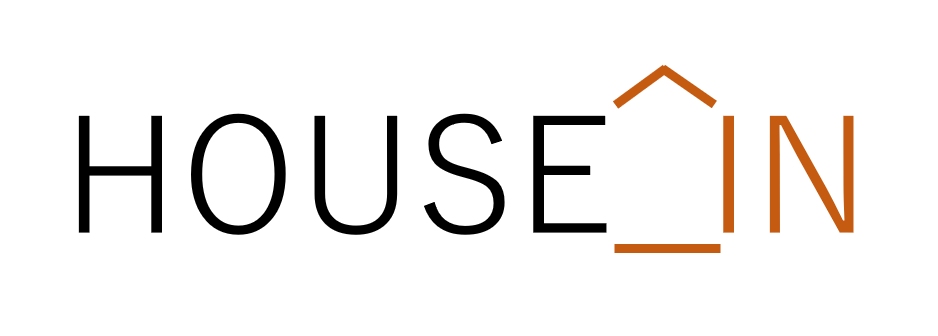
The Housing-Integration-Nexus: shaping exchange and innovation for migrants’ access to housing and social inclusion
Lead Partner: Helmholtz Centre for Environmental Research GmbH - UFZ
Project Staff:
Dr. Annegret Haase
Anika Schmidt
Duration: 6/2021 - 11/2022
Förderung: JPI Urban Europe
Projekt Partners:
University of Latvia, Riga/Latvia
Eutropian GmbH, Vienna/Austria
Austrian Academy of Science, Vienna/Austria
Lund University, Sweden
Malmö University, Sweden
University College London,United Kingdom
Local Practice Partners and Further Partners:
Short Practice Partner Profiles (PDF)
City of Leipzig, Department for Migration and Integration, Leipzig/Germany
International Women/ Internationale Frauen Leipzig e.V., Leipzig/Germany
Contact Point Housing/ Kontaktstelle Wohnen des Zusammen e.V., Leipzig/Germany
City of Riga, Department of Welfare, Riga/Lettland
Gribu palīdzēt bēgļiem/ We want to help refugees, Riga/Lettland
Patverums Drosa Maja/ Shelter “Safe House”, Riga/Lettland
City of Lund, Housing Department, Lund/Schweden
Helsingborgshem, Helsingborg/Schweden
Wiener Wohnen, Vienna/Austria
wohnbund:consult eG, Vienna/Austria
Wonderland – Platform for European Architecture, Vienna/Austria
Summary
Given the context of increased heterogeneous immigration to European cities, HOUSE-IN discussed existing research findings with respect to a common understanding of a Housing-Integration-Nexus. The project identified knowledge and implementation gaps towards integrative housing strategies in European cities, while the focus had been on the situation of migrants and refugees.
The pivotal question was: How can integration be achieved through inclusive housing strategies in urban neighbourhoods?
To respond to this question, HOUSE-IN (1) used existing interdisciplinary and trans-regional knowledge for identifying gaps at the housing-integration intersection, (2) co-created new paradigms of discourse and co-designed innovative housing strategies based on a cross-case learning exchange and (3) fostered new capacities for policy and action trough building a comprehensive methodology for transfer of knowledge. To reach this, HOUSE-IN had set up Urban Living Lab processes including two implementation cases and brought together local stakeholders’ (municipality, housing companies, NGOs, etc.) perspectives for co-creating innovation for improvement.
The Nexus of Housing and Integration
Most European larger cities face considerable immigration, namely from areas within the national borders or from other countries. Apart from its political importance, immigration challenges practices of inclusion and participation in the urban society. We understand integration not only as a process of societal inclusion of newcomers or people with a migration history but all people living in the urban area. A socially sustainable perspective on integration includes both, agreed strategies and approaches as well as alliances of agency and ways of cooperation but also increased involvement of local stakeholders. Housing represents one of the fundamental prerequisites and foundation for structural and social integration into society, is the result of complex daily strategies of learning, navigating and governing the city and to different degrees shaped by choice, economic opportunities or administrative decisions.Consequently, we refered to a Housing-Integration-Nexus. In this comprehensive understanding, housing includes on the one side the living space itself (flat, house, shelter) and on the other side, it relates to the capacity for social participation and care within the residential environment, including close-to-home open space, everyday neighbourly interaction and the proliferation of so-called “micro publics” of encounter. Housing practices at many places still include discrimination and colonial approaches towards migrant demanders and migrant self-support. The Housing-Integration-Nexus approach enabled us to shift our focus onto the experiences of those who ‘have to integrate’, recognizing issues of social justice and concurrence dynamics of low-income groups and paying attention to migrants’ and refugees’ own assessments to housing policy. Yet housing remains an intractable challenge, due to global challenges of the current urban condition and its possible futures such as socio-spatial inequalities and segregation as well as challenges of participation and knowledge integration in a wider understanding.
Cases, implementation and learning: HOUSE IN’s Urban Living Lab process
We focused on four case studies in Leipzig/ Germany, Vienna/Austria, Riga/Latvia and Helsingborg and Lund/Sweden (see Case Study Profiles below). The selection of case studies can be explained by a) the project consortium partners extensive research related to the local Housing-Integration-Nexus in these cities, b) their well-established contacts to local stakeholders and c) the multiple local scenarios of urban development (housing market organization, tenure structure, level of socio-spatial segregation) that still allowed for transfer and scaling up of solutions for other European cities. These four case studies showed different urban characteristics, stakeholder networks and governance approaches related to the Housing-Integration-Nexus and made different but also comparable experiences with the interrelations of housing and migration. In Leipzig, Vienna and Riga we find areas that can be conceived as arrival spaces in the above-mentioned understanding. In Helsingborg/Lund, we find different approaches of innovative housing solutions to address housing shortage and integration of refugees. Thus, we saw much added value in comparing these cases in order to learn from both analogies and differences. With focusing on the Housing-Integration-Nexus, we applied a multi-scale approach that acknowledged the centrality of the local setting, still taking into account that the governance of housing is also shaped by regional and national governance and laws. HOUSE-IN had set up Urban Living Labs (ULL) in these case studies. The ULL approach can be understood as inter- and transdisciplinary action-oriented/applied research approach of iterative learning in order to co-create tailored solutions to real life problems. We brought together the perspectives of scientists, policy-makers, local associations, stakeholders and activists and affected inhabitants in order to identify and jointly address gaps at the intersections of housing and social inclusion.
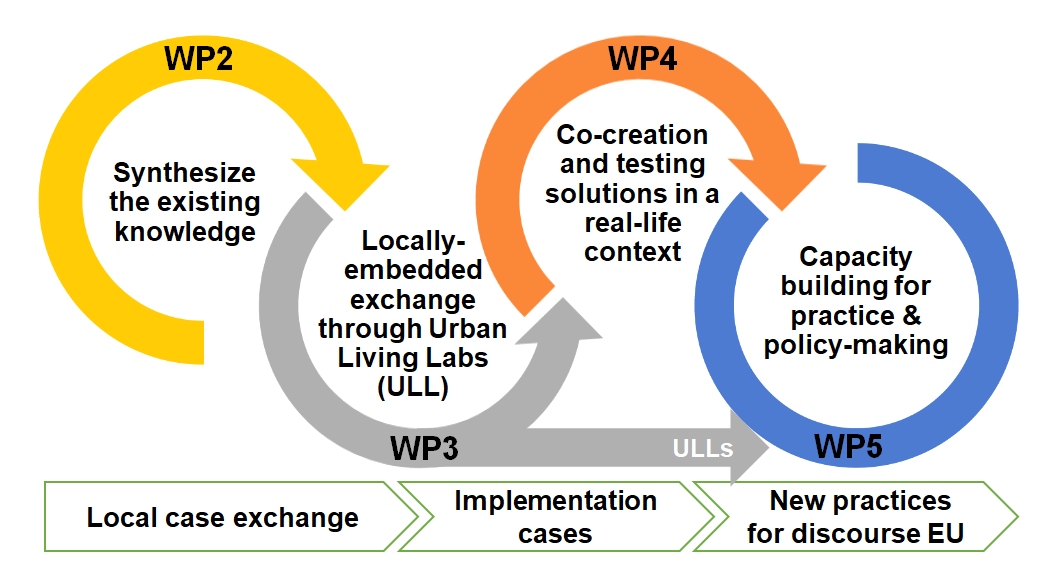
Project Activities
The project activities were organised in five work packages (WPs). WP1 was set up to coordinate and manage the project. It was led by the project coordination and the WP leads and represented also the work package where cooperation within the (wider) consortium and communication towards external partners and the larger public was organized.
WP2-WP5 had been set up to respond to the main objectives of the project and to deliver the results that are formulated as outcomes of the project. WP2 synthesized the existing knowledge amongst consortium members to refine both the a) project objectives as well as b) the analytical framework for the cross-case analysis of the Housing-Integration-Nexus. Within WP3 a locally- embedded exchange within Urban Living Labs (ULLs) was initiated. We will organized a series of local workshops in the case study cites, using various dialogue formats. Solutions for local challenges were elaborated in a co-creative way. WP4 co-created solutions in a real-life context. The consortium selected two implementation case studies (ICS) from the four case studies. The main principles and approaches applied in the co-creation/co-design processes will be applicable to different European contexts. WP5 drew on the knowledge produced in earlier work packages to develop and move policy recommendations onto the governments’ and European policy agenda. In particular, it (1) developed recommendations for local and EU policy-making; (2) identified strategies to increase the applicability of knowledge into practice and approaches for scaling up local experience; and (3) expanded partners’ networks.
In our project, the work had been based on the following principles and approaches:
1) focus on Housing-Integration-Nexus, i.e. looking at housing as a way of integration
2) Urban Living Lap processes in Vienna, Leipzig, Riga, Helsingborg/Lund.
3) co-creation as the way to cooperate with practitioners to achieve integrative housing strategies and tailored solutions with potential for learning and transfer.
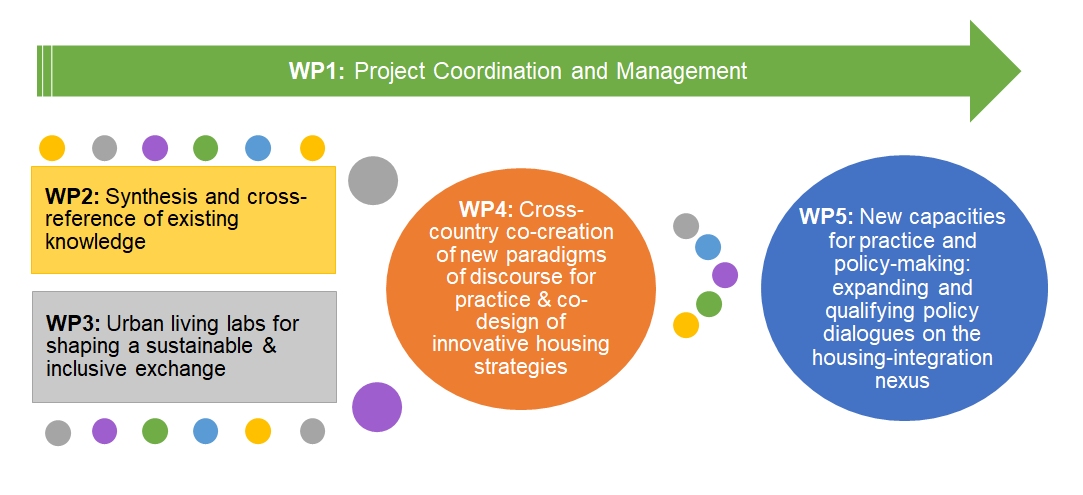 Scheme of the House-In work programme
Scheme of the House-In work programme
Publications
HOUSE-IN Policy Information #1-3
Haase, A.; Arroyo, I.; Astolfo, G.; Franz, Y.; Laksevics, K.; Lazarenko, V.; Nasya, B.; Reeger, U. & Schmidt, A. (2023): Housing refugees from Ukraine: preliminary insights and learnings from the local response in five European cities. Urban Research & Practice. https://doi.org/10.1080/17535069.2023.2225333
Nasya, B.; Haase, A.; Schmidt, A.; Stevens, U.; Laksevics, K.; Arroyo, I.; Franz, Y.; Reeger, U.; Girardi-Hoog, J.; Patti, D.; Gruber, E. (2023): HOUSE-IN Policy Information #1: Forced migrants’ access to housing. Challenges, responses, and recommendations to enable arrival through supporting the right to adequate housing. Policy Information #1
Nasya, B.; Haase, A.; Schmidt, A.; Stevens, U.; Laksevics, K.; Arroyo, I.; Franz, Y.; Reeger, U.; Girardi-Hoog, J.; Patti, D.; Gruber, E. (2023): HOUSE-IN Policy Information #2: Forced migrants’ access to housing. Challenges, responses, and recommendations to enable arrival through supporting the right to adequate housing. Policy Information #2
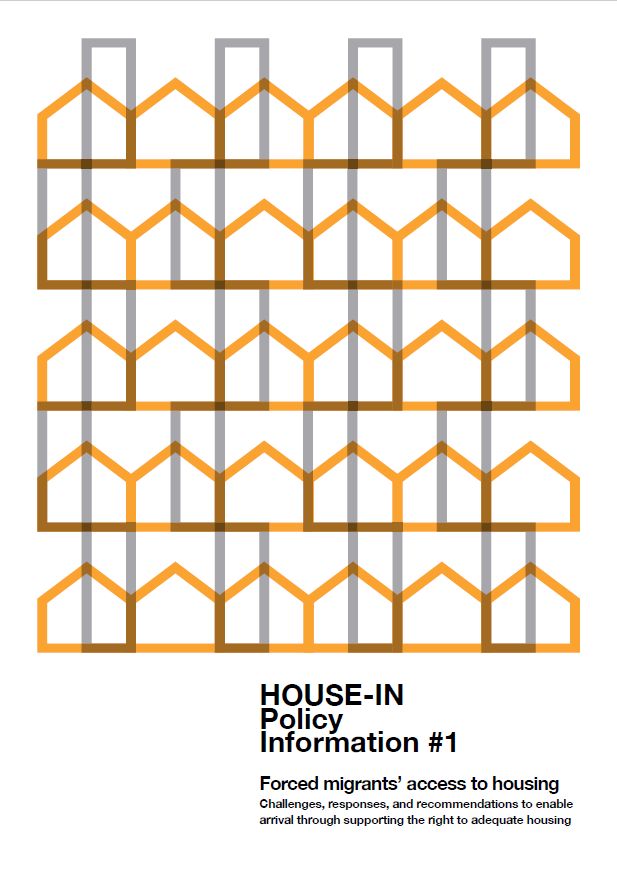
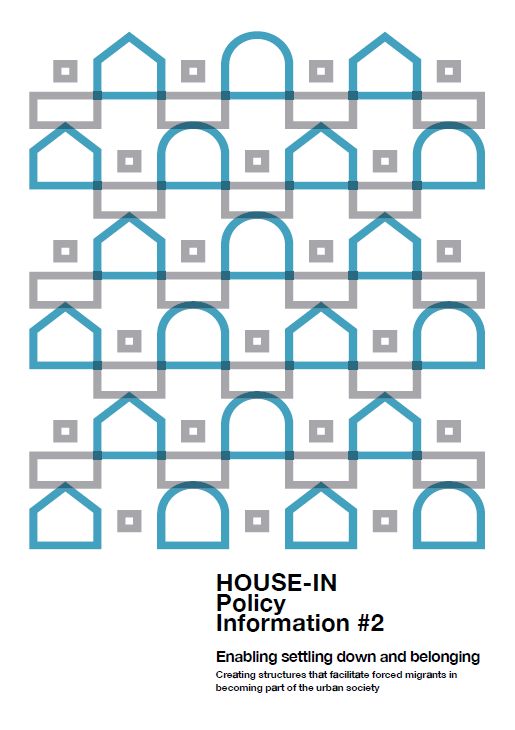
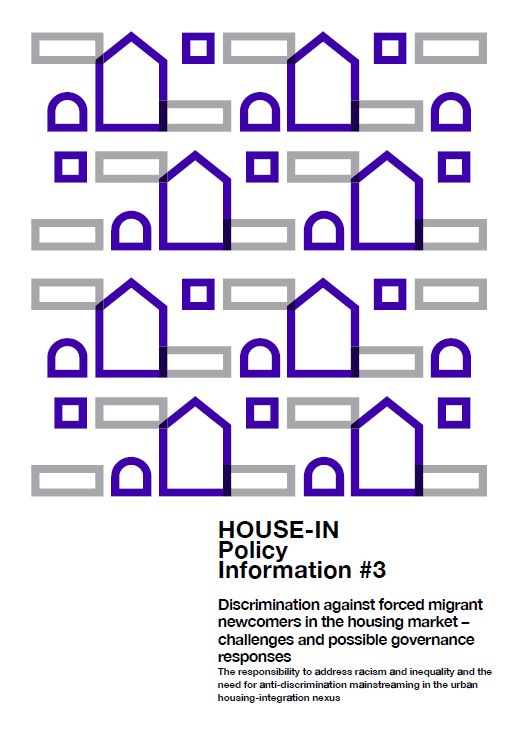
Further Publications
Nasya, B.; Haase, A.; Schmidt, A.; Stevens, U.; Laksevics, K.; Arroyo, I.; Franz, Y.; Reeger, U.; Girardi-Hoog, J.; Patti, D.; Gruber, E. (2023): HOUSE-IN Policy Information #3: Forced migrants’ access to housing. Challenges, responses, and recommendations to enable arrival through supporting the right to adequate housing. Policy Information #3
Stevens, Ulrika; Bod, Sophie (2023): Overcoming isolation: Multigenerational and multicultural co-housing in Sweden (Interview with Dragana Curovic, an Integration specialist and project manager at SällBo). Coope
rative City Magazin, July 6, 202. https://cooperativecity.org/2023/07/06/multigenerational-and-multicultural-co-housing-in-sweden/
Schmidt, Anika; Haase, Annegret (2023): „Ankommen“ und Wohnen von Migrant*innen in europäischen Städten: Einblicke in den transdisziplinären Austausch innerhalb des Projekts HOUSE-IN und die Fallstudie Leipzig. PoWiNE, Bd. 3 (2023): Slavici, Melanie (Hrsg.): Wohnen & Nachhaltigkeit: Politikwissenschaftliche Perspektiven https://doi.org/10.24352/UB.OVGU-2023-005
Astolfo, Giovanna; Allsopp, Harriet; Duszczyk, Maciej; Franz, Yvonne; Haase, Annegret; Laksevics, Karlis; Nasya, Bahanur; Raubisko, Ieva; Reeger, Ursula; Schmidt, Anika (2022): Now and then. Precariousness, double standards and racism in housing refugees. University College London Blog, 20th June 2022.
Haase, Annegret; Allsopp, Harriet; Elina, Ulrika; Franz, Yvonne; Lazarenko, Valeria; Nasya, Bahanur; Raubisko, Ieva; Reeger, Ursula; Saadeh, Bana; Schmidt, Anika (2023): Refugee migration from Ukraine to other parts of Europe – challenges with regard to the housing-integration intersection at the city level. Radical Housing Journal Issue 4.2 / Updates. https://doi.org/10.54825/FIQX5453
Polyak, Levente; Nasya, Bahanur (2022): Social housing with self-determination: Wiener Wohnen’s quest to involve tenants in decision-making. Cooperative City Magazine, 8.6.2022. https://cooperativecity.org/2022/06/08/social-housing-with-self-determination-wiener-wohnens-quest-to-involve-tenants-in-decision-making/
Reeger, Ursula; Franz, Yvonne (2021): Erschwinglicher Wohnraum für Viele, aber nicht für alle. Zuwanderung und der Wiener Wohnungsmarkt. ISR-Bulletin 6/2021. DOI 10.1553/isr-bulletin21-06.
Saadeh, Bana; Nasya, Bahanur (2022): Inclusion Potentials of Co-Housing – A look at OASE.inklusiv. Cooperative City Magazine, 12.12.2022. https://cooperativecity.org/2022/12/12/inclusion-potentials-of-co-housing-a-look-at-oase-inklusiv
Stevens, Ulrika; Nasya, Bahanur (2023): Vienna’s Wohnpartner: Overcoming conflicts in social housing. Cooperative City Magazine, 10.1.2023. https://cooperativecity.org/2023/01/10/viennas-wohnpartner-overcoming-conflicts-in-social-housing
Podcast-Reihe "Ankommen in Leipzig"
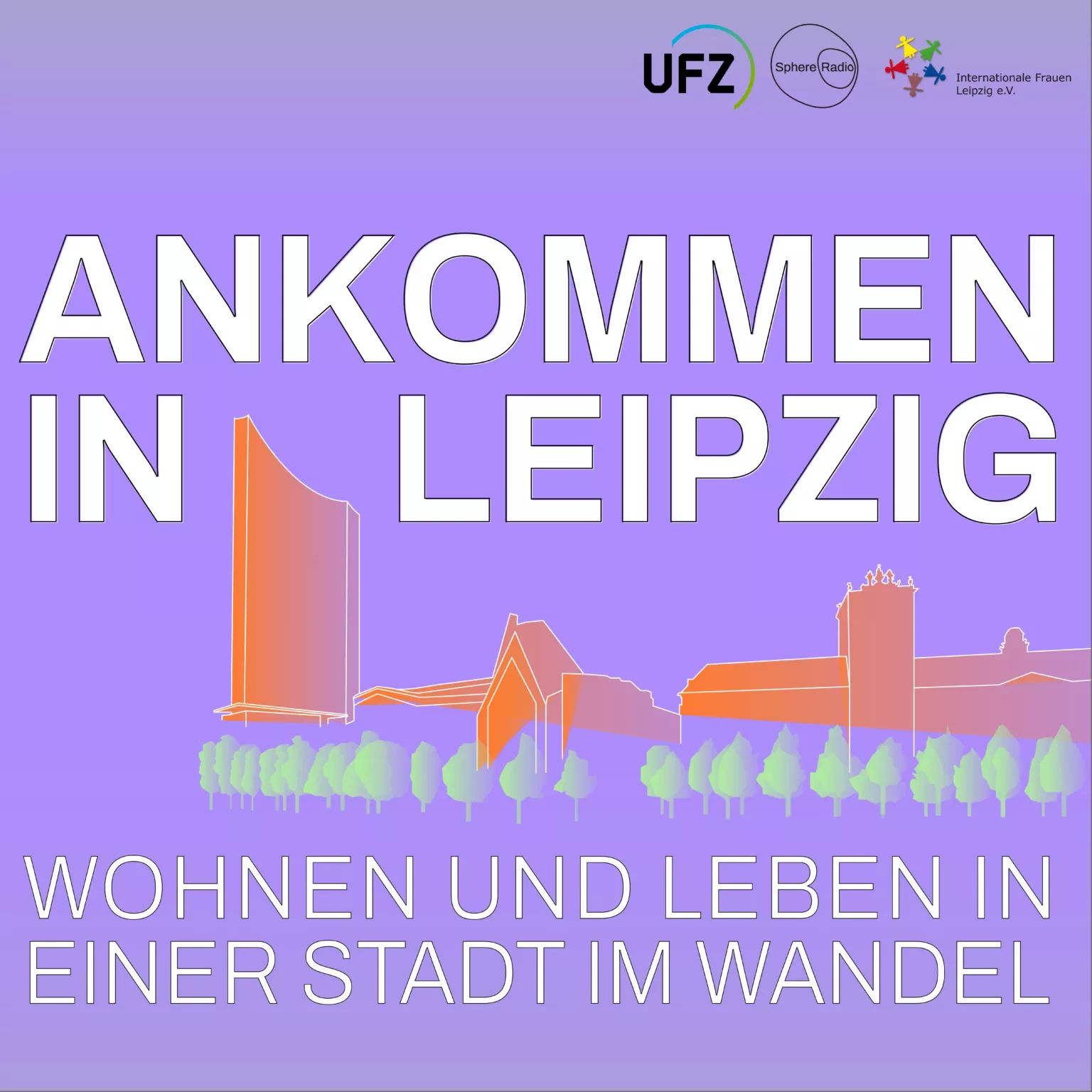 In cooperation with the Leipzig-based community radio "Sphere Radio" we published a podcast series called "Ankommen in Leipzig – Wohnen und Leben in einer Stadt im Wandel" (in German language only). In four parts we give a short insight into the project HOUSE-IN and portray the work of the practice partners in Leipzig.
In cooperation with the Leipzig-based community radio "Sphere Radio" we published a podcast series called "Ankommen in Leipzig – Wohnen und Leben in einer Stadt im Wandel" (in German language only). In four parts we give a short insight into the project HOUSE-IN and portray the work of the practice partners in Leipzig.
You can listen to the podcast series on the website of Sphere Radio: https://sphere-radio.net/projekte/ankommen-in-leipzig/
Documentation of project activities
short report/press information "HOUSE-IN Exchange. Connecting racism and discrimination in refugee housing and home-making", (September 27, 2022)
Documentation of the HOUSE-IN Cross-Country Online Exchange: How to cope
with future challenges. Learning with Ukraine (September 28, 2022)
Documentation of the HOUSE-IN Cross-Country Online Exchange: Connecting
racism and discrimination in refugee housing and home-making (September
20, 2022)
Short Documentation of the Final Meeting in Leipzig (November 9-11, 2022)
Video of the event "Wohnen im Dialog: Wohnen und Migration" organised by Netzwerk Habitologie with a presentation of the HOUSE-IN project (in German, March 20, 2023)
Case Study Profiles (2022)
